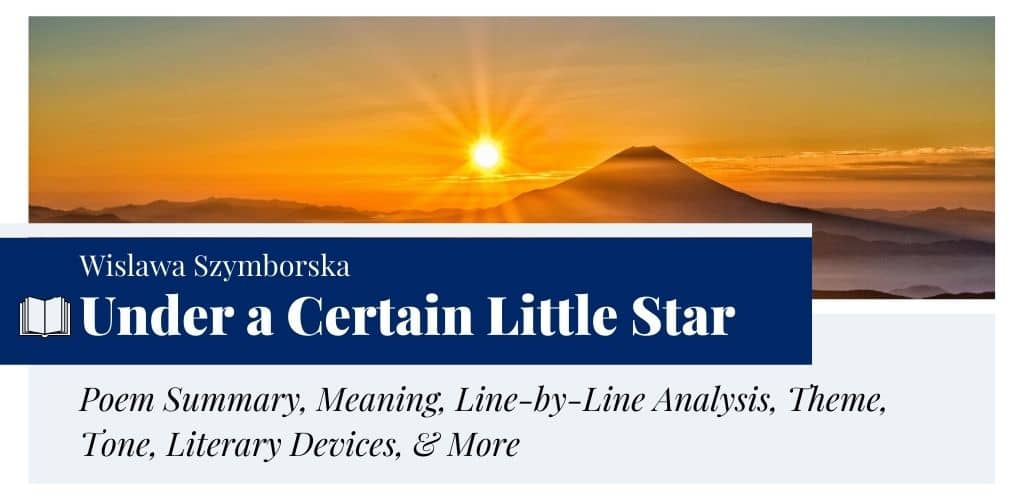Under a Certain Little Star by Wislawa Szymborska
“Under a Certain Little Star,” also known as “Under One Small Star,” is a long, remarkable poem written by Wislawa Szymborska in Polish. The original title of the poem is “Pod jedną gwiazdką.” Szymborska is a Polish poet born on July 2, 1923, in Prowent (Bnin), Poland (now part of Kórnik), close to the city of Poznań, in western Poland. She was awarded the Nobel Prize in Literature in 1996.
Szymborska is an empathetic, witty, and ironic poet who made her debut in writing in 1945. She is best known for her collection of poems like People on a Bridge (1990), View with a Grain of Sand (1995), Miracle Fair (2001), and Monologue of a Dog (2005).
- Read the full text of “Under a Certain Little Star” below:
Under a Certain Little Star by Wislawa Szymborska My apologies to chance for calling it necessity. My apologies to necessity in case I’m mistaken. May happiness not be angry if I take it for my own. May the dead forgive me that their memory’s but a flicker. My apologies to time for the multiplicity of the world overlooked each second. My apologies to an old love for treating the new one as the first. Forgive me far-off wars for taking my flowers home. Forgive me open wounds for pricking my finger. My apologies for the minuet record, to those calling out from the abyss. My apologies to those in railway stations for sleeping comfortably at five in the morning. Pardon me hounded hope for laughing sometimes. Pardon me deserts for not rushing in with a spoonful of water. And you O hawk, the same bird for years in the same cage, forever still and staring at the same spot, absolve me even if you happened to be stuffed. My apologies to the tree felled for four table legs. My apologies to large questions for small answers. Truth, do not pay me too much attention. Solemnity, be magnanimous to me. Endure, O mystery of being that I might pull threads from your veil. Soul, don’t blame me that I’ve got you so seldom. My apologies to everything that I can’t be everywhere. My apologies to all for not knowing how to be every man and woman. I know that as long as I live nothing can excuse me, because I myself am my own obstacle. Do not hold it against me, O speech, that I borrow weighty words, and then labor to make them light. - from Spring 2001 issue of The Virginia Quarterly Review (VQR)

Summary
The poem “Under a Certain Little Star” explores the inadequacy of a speaker, her feelings of remorse that she experienced at a certain stage in life. Inadequacy lays her heavy hands when one cannot undo the things already done – when one cannot go back making things right, or the wish to relive a moment dies. The universe conspires the speaker to realize that time has passed. It has already slipped out of her hands like sand. The main message of the poem can also be interpreted as the loss of an opportunity that may or may not come to the speaker again.
Meaning
“Under a Certain Little Star” is a poem about seeking forgiveness from every force of nature or abstract ideas. It is about freeing oneself from feelings of guilt and remorse by openly apologizing for one’s insufficiency. In this poem, Szymborska’s poetic persona addresses a number of ideas in a sorry tone. She asks forgiveness for being too selfish to ignore the needs of the hour. Szymborska encompasses a range of ideas she is sorry for, including forgetting her old love or being impassive to suffering. She comes to the conclusion that she is her worst obstacle. In order to voice the real concerns, she needs to conquer her own mind.
Structure & Form
“Under a Certain Little Star” is a long narrative, running into 27 lengthy lines, with an apologetic tone. The lines are separated into two stanzas. The poem follows no specific rhyme or rhythm as it is composed in the free-verse. In this piece, the speaker can be regarded as the poet herself. It can also be an omniscient narrator who is remorseful to everything and everyone who comes in its way. The poem is told from the perspective of a first-person narrator.
Literary Devices & Figurative Language
Szymborska’s “Under a Certain Little Star” showcases the following poetic devices:
- Personification: It means denoting human qualities to animals, objects, or abstract ideas. The poet personifies abstract ideas as living beings; for instance, she invests “chance,” “necessity,” “happiness,” “time,” “hope,” “deserts,” “cut-down trees,” “large questions,” with human attributes.
- Anaphora: This device is used extensively throughout the text. Szymborska employs this device for the sake of emphasizing her thoughts.
- Repetition: It occurs when a word or phrase frequently occurs throughout the text. The phrase “My apologies” occurs a number of times throughout the text. It is meant to show the speaker’s urgency to seek forgiveness.
- Periphrasis: The sun is referred to as “A Certain Little Star” that sits at the center of our universe.
- Metaphor: It is a comparison of two, unlike things without the use of as or like. For example, (add)
- Irony: It is a poetic device that shows a contrast between expectations and reality. For instance, the phrase “a certain little star” is a reference to the sun. Here, Szymborska qualifies the sun with the adjective “little” despite being the largest in our universe.
- Apostrophe: By implementing this device, she addresses the “Hawk,” “Truth,” “mystery of being,” and “speech.” It makes these ideas or things appear as human beings.
Line-by-Line Analysis & Explanation
Stanza One
Lines 1-5
My apologies to chance for calling it necessity.
My apologies to necessity in case I’m mistaken.
May happiness not be angry if I take it for my own.
May the dead forgive me that their memory’s but a flicker.
My apologies to time for the multiplicity of the world overlooked each second.
Wislawa Szymborska’s poem “Under a Certain Little Star” begins with an apologetic tone. The speaker is highly remorseful for doing certain things in life which she might not undo in time. She apologizes for calling “chance” to be a “necessity.” Then she asks forgiveness from “necessity” for calling it the other way.
The speaker feels so low that she takes utmost care not to make “happiness” angry if she chooses to be happy in her life. Furthermore, she is not able to picture her ancestors (“the dead”) in her mind as their images are too blurry to remembrance.
The feeling of forgiveness arises again in the speaker’s heart for not paying much attention to the world around. It seems to her as if she just “overlooked” the intricate details and goodness in the world.
Lines 6-10
My apologies to an old love for treating the new one as the first.
Forgive me far-off wars for taking my flowers home.
Forgive me open wounds for pricking my finger.
My apologies for the minuet record, to those calling out from the abyss.
My apologies to those in railway stations for sleeping comfortably at five in the morning.
In these lines, the speaker is sorry for not realizing the feelings of her first love. She just overlooked the bond and moved on to the other one, calling it “as the first.” Moreover, she cannot express how regretful she is for bringing home the flowers that were meant for the graves of war victims. She should have paid some respect/care for those who died in the war.
In this overall stanza, Szymborska’s voice is remorseful for reopening the “open wounds.” These metaphorical wounds of her heart remind her of the painful old days. However, she criticizes her over-dramatic reaction to a small prick on her finger while others suffer at their worst. In this world where people cannot raise their voice out loud to be heard by the ones in power, she just broods upon her personal “wounds.”
Furthermore, the speaker regrets and asks forgiveness from the sleep-deprived ones at the railway station. They cannot even sleep while she rests comfortably at her soft, cozy bed.
Lines 11-20
Pardon me hounded hope for laughing sometimes.
Pardon me deserts for not rushing in with a spoonful of water.
And you O hawk, the same bird for years in the same cage,
forever still and staring at the same spot,
absolve me even if you happened to be stuffed.
My apologies to the tree felled for four table legs.
My apologies to large questions for small answers.
Truth, do not pay me too much attention.
Solemnity, be magnanimous to me.
Endure, O mystery of being that I might pull threads from your veil.
Szymborska uses various images to show her guilt or remorse in these lines. Her persona is apologetic for not taking “hope” seriously. Conversely, she laughed at the idea of hope by looking at the condition of the modern world.
In the next line, she asserts that she should have carried “a spoonful of water” (which the desert is scarce of) to “deserts.”
Furthermore, she addresses the “hawk” and pities it for living in the “same cage” for ages. The bird of prey sits still, “staring at the same spot.” In the next line, she atones the damages caused to nature. People cut “trees” down to use them for materialistic things such as “four table legs.”
She asks for forgiveness from the “large,” important questions as her answers to them were short. It shows her lack of effort in answering an important question vital for humankind to know.
Her tone takes a turn as she asks “Truth” to be inattentive and “Solemnity” to be “magnanimous” to her. She calls the idea “existence” a “mystery of being” and seeks forgiveness for raising a question about it. She apologizes “mystery of being” as she might overcomplicate things: “pull threads from your veil.”
Stanza Two
Lines 21-27
Soul, don’t blame me that I’ve got you so seldom.
My apologies to everything that I can’t be everywhere.
My apologies to all for not knowing how to be every man and woman.
I know that as long as I live nothing can excuse me,
because I myself am my own obstacle.
Do not hold it against me, O speech, that I borrow weighty words,
and then labor to make them light.
The overall tone of “Under a Certain Little Star” is sad and thoughtful. Particularly, readers can get an exact idea of the speaker’s mental state from this section.
In the beginning, she requests “Soul” not to blame her for owning or holding possession of it. On the other hand, she regrets not being present at every possible place she could be. She is also apologetic for her inability to understand/feel “every man and woman.” Szymborska’s word choice creates an overall effect of dullness and insufficiency in these lines.
The speaker again says that nothing can excuse her existence. None would vouch for her inadequacy as she is a hindrance to herself: “I myself am my own obstacle.”
Szymborska ends the poem with an undertone of not meaning the things that she said earlier. She is indebted to the “speech” for letting her use its “weighty,” complicated vocabulary. But on the other hand, she tries hard to dilute the effect of her feelings of remorse and insufficiency on readers’ minds.
In this way, Szymborska confesses by simplifying her ideas in depth and connotation in the lines above.
Theme
Szymborska writes the poem “Under a Certain Little Star” in a simple, pointed, and direct manner. This piece is lyrical at the same time. Her speaker highlights the insignificance of her existence in the world. She cannot count herself in any of the contributing factors to humanity. There is a sense of desolation and isolation when it comes to seeing her as an individual. The only thing that she does in the entire poem is remorseful, seeking forgiveness for the deeds she did or is unwilling to do. The overall idea of the whole poem is unbearably sad and evokes a sense of inadequacy in readers as well.
Tone
The overall tone of the poem is thoughtful, dejected, sorrowful, and emotive. Szymborska’s poetic voice knocks at the door of every possible abstract idea to seek forgiveness. It, in turn, makes her look like a useless being in the overall frame. This piece is full of negative emotions like guilt, remorse, repentance, and want. These emotions fuse together and make this poem more of a sad, thought-provoking lyric.
Historical Context
Wislawa Szymborska (1923-2012) often weaves her poems with various literary devices such as symbolism, irony, and paradox. She employs contrasting elements to illuminate the universal themes of war, terrorism, and death. Her perspective of writing poetry is unique and unpopular among her contemporaries. Most of her poems have historical elements blended with the objects from daily life. They are woven together so smoothly that they coexist well in her poetic framework. Her poem, “Under a Certain Little Star,” also known by the title “Under One Small Star,” appears in the Spring 2001 issue of The Virginia Quarterly Review (VQR) along with her three other poems. This piece is translated by Joanna Trzeciak, best-known for the collection of her translations of Szymborska’s poems, Miracle Fair (2001). Explore the best-loved Wislawa Szymborska poems.
Questions and Answers
Wislawa Szymborska’s poem “Under a Certain Little Star” or “Under One Small Star” can be regarded as a testament to the poet’s vision. In this poem, she apologizes for being self-centered. Through writing this poem, she tries to chalk out what she should not do. Her main idea is to voice real global concerns.
The main themes highlighted in “Under a Certain Little Star” are inadequacy and remorse. This piece also taps on the themes of society, humanity, nature, suffering, and the role of writing/art.
In the title, the term “Certain” hints at the identity of the “Little Star.” It is none other than the center of our universe, the sun. She projects it as a “Little” star in order to compare herself to it. In this poem, she expresses how insignificant she feels with respect to humankind.
Szymborska addresses the “Hawk” in this poem. It is caged for several years in the same old cage. The bird sits still and keeps staring at the same spot as if someone has not only caged it but also clipped its soul while putting it in the cage. In this piece, the “Hawk” symbolizes the poet herself.
In the final lines, the speaker concludes by saying that nothing can excuse her for her inability to voice her real concerns. No matter how she keeps ignoring the “weighty” concerns by beating around with “light” explanations, someday she has to face them. Then, she will be required to give a proper explanation.
The speaker asks “Truth” not to pay her too much attention. It is an indirect way of saying that she wants to ignore the truth as it is too harsh to digest.
The speaker spends most of her time apologizing for her inadequacy, insignificance, and incapacity throughout the poem.
The audience of this poem includes a number of abstract ideas ranging from “chance,” “necessity,” and “happiness” to “Truth,” “soul,” and “speech.” Mainly, this poem is a kind of soliloquy uttered “under a certain little star” (sun) as a witness.
In this line, the poet addresses the wars fought far away from her home. She seeks an apology for not bringing flowers to pay homage to war victims.
Wislawa Szymborska is a poet of Polish origin. She was born in Prowent, Poland, in 1923. Szymborska wrote fewer than 350 poems. Some of her best-known poems are “People on the Bridge,” “View with a Grain of Sand,” “That’s Why We Are All Alive,” “The End and the Beginning,” etc. Szymborska won numerous awards for her poetry, including The Polish PEN Club prize (1996), Nobel Prize in Literature (1996), and Order of the White Eagle (2011).
Similar Poems about Guilt and Inadequacy
- “Monna Innominata: I wish I could remember that first day” by Christina Rossetti — This poem is about reminiscing about one’s first love and the regrets that surface with age.
- “The Toys” by Coventry Patmore — This piece centers on an incident of a father rebuking his son and the son’s guilt for disobeying him.
- “Bora Ring” by Judith Wright — In this poem, Wright laments the cultural loss after the European settlement in Australia.
- “Grief Calls Us to the Things of This World” by Sherman Alexie — It is a poem about a son’s forgetfulness about his father’s recent death.
External Resources
- Other Translations of “Under a Certain Little Star” — Explore four translations of the poem side by side.
- Spring 2001 issue of VQR — Explore more poems Wislawa Szymborska’s poems published in this issue.
- “Borrowing Weighty Words” from Wislawa Szymborska — Read about the different translations of Szymborska’s “Under One Little Star.”
- Biography of Wislawa Szymborska — Read the full biography of the poet available on the official website of the Nobel Prize organization.
- Poet Profile & Poems of Wislawa Szymborska – Explore more about the poet and read some of her best-known poems.
- Check out Here by Wislawa Szymborska — Explore this collection of twenty-seven poems rendered into English by prize-winning translators.


